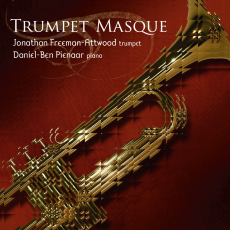Trumpet Masque - Jonathan Freeman-Attwood - Opus Music (translation)
In English the term "mask" refers to performances for entertainment in 16th and 17th-century England, which included poetry, music and dance, more or less the equivalent of our masquerades. However that may be, on this recording the term has more to do with musical forms which we could call chamber, and which are based on types of dance specific to the 17th century, in addition to sonata type works including pieces of religious origin.
This disc presents 16 works, many of which are arranged for the trumpet but all of them for the piano, because none of the composers succeeded in really knowing this instrument. In some of works there is less need for the organ, more because of the character of the composition than the timbre of the instruments used, although the arrangements are excellent.
We cannot comment today on each and every one of the works, but we must highlight the brilliant run, like a cry for attention, of Louis Marchand's work (Grand dialogue du 5e ton), the fusion of the counterpoint between the trumpet and piano in Gabrieli's Canzon second, the dancing character of the piece by Monteverdi, which seems rather shocking with its title, Laudate Dominun, the solemnity of Buxtehude's Ein feste Burg is unser Gott, which explores the entire register of the solo instrument, the contemplative melody of Purcell's Fantasia 4, Lully's courtesan, delicate and expressive cantabile, Scocca pur, and Sweelinck's powerful, rich and generous Varaciones sobre Onder een linde groen, perhaps the most splendid piece of the entire recording.
The two Spanish pieces (Juan Cabanilles' Tiento XVII de Pange linguaI, and Francisco Correa de Arauxo's Tiento de medio registro) are, in our view, the least successful arrangements, as the absence of the organ is very marked.
Jonathan Freeman-Attwood, on the trumpet, is also a music critic, recording producer and teacher, and has occupied many educational roles at the Royal Academy of Music. He has made many recordings, mainly of baroque music, although he has also paid special attention to unknown works by composers such as Elgar or Fauré. What stands out on this recording is an impressive "fiato", an impeccable finish (just listen to the entry in the piece by Purcell), as well as virtuosity and technical exuberance. Also to be mentioned is the nobility of the timbre of the trumpet: an authentic demonstration of power and, above all, of musicality. Accompanying him is the South African pianist Daniel-Ben Pienaar, laureat of many major awards, with recordings dedicated to works by Bach and Chopin, who on this recording develops a major task; here we have not so much the usual accompaniment as a harmonic support for the soloist. He is a true companion who has to take charge of very compromising parts.
This recording surprises and commands, almost immediately, a second and third listening. There is absolutely no justification for denying it such attention. The sole inconvenience, of great importance to us, is that the notes are only in English. A language and a market like ours merit a little more consideration.

